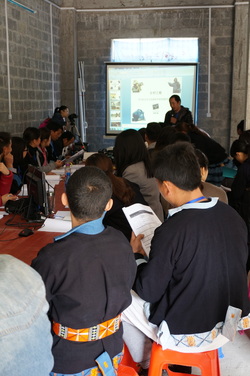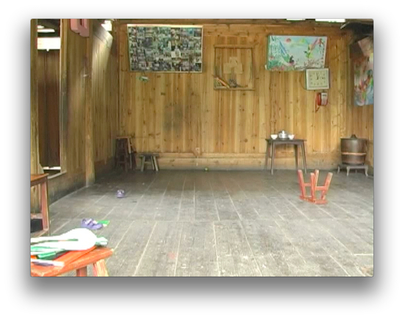 Participation in and Observations on Community Media Training This past March, I spent three weeks in Guangxi, attending and helping out with a community media training workshop. The program was collaboratively organized by a cultural heritage group based in Kunming that has extensive experience in rural video documentary and participatory media training, and a local Baiku Yao cultural heritage preservation group based in Lihu. It was my first time working directly with students and workshop participants, assisting them with the basics of field interviews and recording, documentary research, and editing on the fly. I was amazed at how dedicated all of the participants were and even more so by the fact that every group managed to complete a 20-30 minute long documentary in just 10 days. This experience also gave me much greater insight into the values and politics of community media, especially when coupled with broader desires (and financial support) for cultural heritage preservation, rural development, and individual ambitions. There is a very active eco-museum, supported by the regional government, in this area too that has helped spur local recognition of the usefulness of digital media in cultural heritage work.  These Days, These Homes (work in progress) Recently I've been thinking a lot about the video footage I shot over the past (nearly ten) years, and I've decided it's time to revisit this material and to try to create something new out of this "old" stuff. As I review the footage, I realize that part of what is so important, and interesting, about archival material (even if it's an archive of my own material) is precisely that with the passing of time and the changing of lives, I am seeing and discovering new meanings to this footage. I'm now starting a new film project, currently titled These Days, These Homes, that will draw on existing footage and some new video I plan to shoot over the next year. This film will focus on the stories of two women who have become important interlocutors and friends, and I hope this film will be as much a presentation of research arguments as it is a representation of our personal relationships and my gratefulness to them. I recently discussed this work in progress at the conference, Poetics & Politics: A Documentary Research Symposium at UC Santa Cruz. There, the conversations between a mix of makers and scholars from a range of disciplines pushed me to think about my new film in different directions, both formally and also socially as a means of research engagement and collaboration. Last fall, I taught a course on ethnicity and nationalism in East Asia as a special topics class in Anthropology, and now I'm excited to have received a Course Development Grant to expand it further into a class that will also address race and racial discourses in East Asia for the East Asian Studies program at Emory (with a cross-listing Anthropology). In the Fall 2014 class, my students and I learned a lot from each other about dominant, social assumptions about race and racialized identity in the contemporary world, and it was eye opening for all of us to re-pivot our own gazes and expectations to the East Asian context, to question what is often taken for granted in discussions about what constitutes race and/or ethnic difference in a society and, just as importantly, what is similar across national contexts.
Here's the current description of this new class, Race, Ethnicity, and Nationalism in East Asia: This course uses an anthropological perspective on race, ethnicity, and nationalism to ask: Is there such a thing as an “Asian” race? What are the theoretical foundations of race and ethnicity, and what is a nation in this contemporary era of globalization and multiculturalism? Why is nationalism potentially dangerous in some contexts and a source of pride in others? The goal is to introduce students to contemporary society and the politics of identity in China, Japan, and South Korea through the exploration of these questions. Through analytical writing assignments and an independent research paper, we will interrogate the sociopolitical, cultural, and conceptual meanings of race, ethnicity, and nationalism in the context of East Asia. We will read contemporary ethnographic studies of racism and ethnic differences in East Asia as well as historical and theoretical studies that provide a broader context for understanding how race and ethnicity are differently conceived in Japan, China, and the Koreas. While the focus of the course will be on the contemporary context, we will also use historical texts on definitions of racialized differences in Japan and China from the early twentieth century. By investigating ethnic identity, national belonging, racism and racialized differences, and political (dis)unity in China, Japan, and South Korea, our aim is to build a broader perspective not only on country-specific conditions but also regional similarities and current disputes. In particular, readings will address the role and impact of economic growth, consumerism, memory and trauma, and migration on changing discourses of ethnicity, race, and the nation in East Asia. |
Archives
April 2024
|